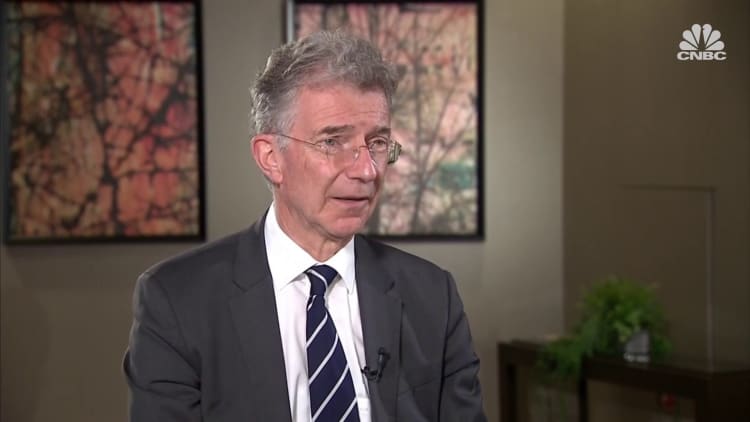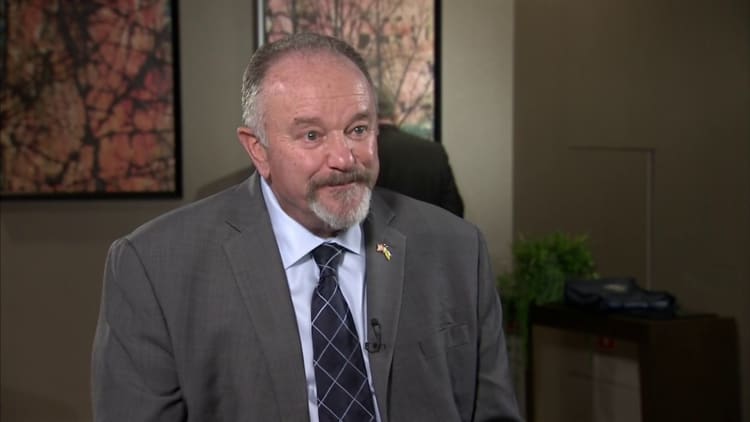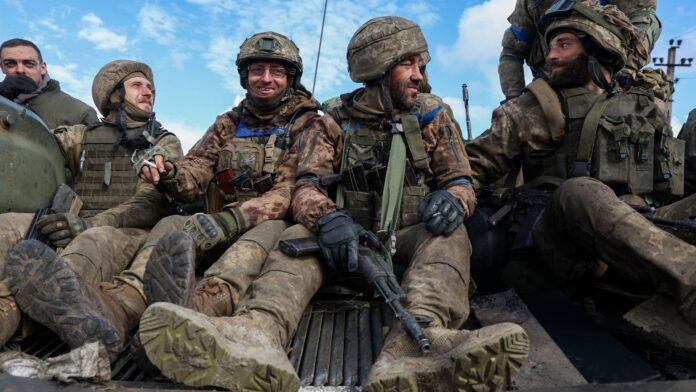Putin signs law formally annexing four Ukrainian regions
Russian President Vladimir Putin meets the Moscow-appointed heads of four Ukrainian regions, partially occupied by Russia, at the Grand Kremlin Palace on Sept. 30, 2022, in Moscow, Russia.
Contributor | Getty Images News | Getty Images
Russian President Vladimir Putin has signed laws formally annexing four Ukrainian regions that are partially controlled by Russian forces, Russian state-owned news agency RIA Novosti reported Wednesday.
The move comes after sham referendums were held in the regions of Kherson, Zaporizhzhia, Luhansk and Donetsk. The results, widely seen as faked and illegitimate, showed a majority of people wanting to join the Russian Federation.
Both Russia’s upper and lower houses of parliament (the Duma and Federation Council, or Senate) approved legislation ratifying the annexations earlier this week, leaving President Vladimir Putin to put his signature to the laws formally annexing the territories.
Ukraine and the vast majority of the international community do not recognize the annexation, slamming it as illegal and farcical.
Russian forces have varying levels of control over the regions, with Ukrainian forces making gains in the south (around Kherson) and east, and its forces advancing in Donetsk and towards Luhansk. The Kremlin also said it had yet to determine the borders of annexed territory in Kherson and Zaporizhzhia.
— Holly Ellyatt
Putin is ‘literally out of moves,’ ex-CIA chief says
Russian President Vladimir Putin, whose forces look increasingly ill-equipped and outmaneuvered on the battlefield, is running out of options in the war in Ukraine, according to David Petraeus, a former CIA director and retired U.S. Army general.
When asked what Putin’s next move could be in Ukraine, whose armed forces are making significant gains in counteroffensives in the south and east of the country, Petraeus told CNBC’s Hadley Gamble he believes Putin is “literally out of moves.”
“He’s trying all these different desperate actions. But the fact is the reality that confronts Russia on the battlefield is that Ukraine has a vastly more capable and larger force than the country [Russia] that is more than three times their size. The reality on the battlefield now is desperate for Putin,” he added.
“There’s literally nothing he can do. It is irreversible,” he said, noting that even sham referendums staged by Russia in four regions, with the fake votes leading to those regions being “annexed,” had not changed anything.
“The Ukrainians are already taking back … The momentum on the battlefield, is very much against Russia, they’re scrambling just to establish new defensive positions.”
The former CIA chief warned against getting carried away with Ukraine’s recent advances, warning that Russia is unpredictable.
“Don’t misinterpret this, there’s still an enormous amount of damage and destruction that Russia can do, they can punish. And they will continue to punish Ukraine on a daily basis with missiles and rockets and bombs and so forth. But at the end of the day, they cannot reverse the situation on the battlefield, which is going to see Ukraine, taking back the territory that Russia has taken since 24 February, and perhaps taking back everything that Russia has taken from them since 2014,” he said.
In 2014, Russia annexed Crimea from Ukraine, an act that accompanied the creation of pro-Russian separatist blocs in eastern Ukraine (with the so-called “people’s republics” in Luhansk and Donetsk) and which led to February’s invasion.
— Holly Ellyatt
There are signs that Russia is falling apart, says Munich Security Conference chair

Christoph Heusgen, chair of the Munich Security Conference, says, however, that it’s difficult to say how long the situation will play out.
Lukashenko is a ‘cheap partner’ to Putin, says leader of Belarusian Democratic Movement
Russian President Vladimir Putin and his Belarusian counterpart Aleksandr Lukashenko are in a “fake friendship” with both sides just using each other, according to Belarusian Democratic Movement leader Sviatlana Tsikhanouskaya.
“They use each other because … Lukashenko is a loyal partner … very cheap partner, I would say, who gives [Putin] territory to attack Ukraine,” she told CNBC’s Hadley Gamble on Tuesday.
In February, Lukashenko hosted Russian troops and equipment, and permitted Russia to use Belarus as a staging post for its invasion of Ukraine.
The opposition leader described the relationship of the two leaders as a symbiotic one.
“Without Putin, Lukashenko won’t survive the events of 2020. So they need each other, and they use each other.”
Lukashenko claimed victory in the 2020 Belarusian presidential election, which was contested by Tsikhanouskaya at that point in time.
The victory of Ukraine against Russia is “crucial for Belarus,” the democratic leader emphasized, “because this victory will give us opportunity, one movement of opportunity to apprise and to get rid of the [Putin’s] regime.”
“That’s why it’s so important for [everyone] to support Ukrainians as much as we can.”
— Lee Ying Shan
‘Good news from the front lines’: Ukraine’s forces count significant gains in counteroffensives
President Volodymyr Zelenskyy says Ukraine’s military has made swift and significant progress in its counteroffensives in the south and east of the country, recapturing dozens of settlements in regions Russia claims to have annexed.
“We have good news from the front lines,” the president said in his nightly address Tuesday, “the Ukrainian army is making pretty fast and powerful movements in the south of our country as part of the current defense operation.”
“Dozens of settlements have already been liberated from the Russian pseudo-referendum this week alone. This is in Kherson region, Kharkiv region, Luhansk region and Donetsk region together,” he said, referring to the regions where sham votes on joining Russia were held in late September.
Ukrainian soldiers adjust their national flag atop a personnel armored carrier on a road near Lyman, in the Donetsk region, on Oct. 4, 2022.
Anatolii Stepanov | Afp | Getty Images
Naming a series of settlements that had been liberated in Kherson in southern Ukraine, Zelenskyy said that “this is far from a complete list. Our soldiers are not stopping. And it’s only a matter of time before we expel the occupier from all of our land.”
Ukraine’s continuing advances into Russian-occupied territory has prompted concerns that President Vladimir Putin might resort to using nuclear weapons as his army suffers defeats on the battlefield.
Those concerns rose Tuesday on reports online that Putin had sent a convoy of vehicles, belonging to the Russian unit in charge of the country’s nuclear arsenal, to Ukraine. But experts have said such reports should be viewed with caution.
— Holly Ellyatt
World Bank estimates Ukraine’s war-torn economy will sink 35% in 2022
Destruction after an apartment building hit by Russian attack in Kyiv, Ukraine on March 14, 2022.
Alejandro Martinez | Anadolu Agency | Getty Images
Devastated by Russia’s invasion eight months ago, the Ukrainian economy will plunge 35% this year, the World Bank forecast.
The war has destroyed factories and farmland and displaced millions of Ukrainians. The World Bank, a 189-country anti-poverty agency, estimates that rebuilding the country will cost at least $349 billion, 1.5 times the size of Ukraine’s prewar economy.
“Ukraine continues to need enormous financial support as the war needlessly rages on as well as for recovery and reconstruction projects,” said Anna Bjerde, World Bank vice president for Europe and Central Asia.
Still, the bank’s assessment for Ukraine’s economy marks an upgrade from the 45.1% freefall it forecast in June. And it expects that the Ukrainian economy will return to growth in 2023, expanding 3.3% — though the outlook is highly uncertain and will depend on the course of the war.
Meanwhile, the Russian economy, hammered by Western sanctions, is expected to shrink both years — by 4.5% in 2022 and 3.6% next year. In June, however, the bank had predicted the Russian economy would fare even worse this year, shrinking by 8.9%. The energy-producing Russian economy has proven surprisingly resilient, helped by a surge in oil and natural gas prices.
— Associated Press
Latest U.S. weapons package for Ukraine brings commitment to $16.8 billion since Russia invaded
Pro-Russian separatist forces are seen in the Donetsk Oblast in eastern Ukraine on May 28, 2022.
Anadolu Agency | Anadolu Agency | Getty Images
The Biden administration announced another $625 million military aid package for Ukraine on Tuesday, bringing the U.S. commitment to more than $16.8 billion since Russia invaded the country in late February.
The latest weapons package includes four High Mobility Artillery Rocket Systems, or HIMARS, as well as munitions for those systems, 16 155mm and 105mm Howitzers, 75,000 155mm artillery rounds, 500 precision-guided 155mm artillery rounds, 1,000 155mm rounds of Remote Anti-Armor Mine, or RAAM systems, 200 mine-resistant armored vehicles and 200,000 rounds of small arms ammunition.
“Recent developments from Russia’s sham referenda and attempted annexation to new revelations of brutality against civilians in Ukrainian territory formerly controlled by Russia only strengthens our resolve,” Secretary of State Antony Blinken wrote in a statement announcing the 22nd weapons installment.
“The capabilities we are delivering are carefully calibrated to make the most difference on the battlefield and strengthen Ukraine’s hand at the negotiating table when the time is right,” Blinken added.
— Amanda Macias
Lack of training and supplies will continue to plague Russian troops and mobilized recruits
Service members of pro-Russian troops load ammunition into an armoued personnel carrier during fighting in Ukraine-Russia conflict in the southern port city of Mariupol, Ukraine April 12, 2022.
Alexander Ermochenko | Reuters
The British Ministry of Defense said Russia likely will have difficulty training and equipping the hundreds of thousands of troops recently mobilized to fight in Ukraine.
Since the early days of the war, Russian forces on the ground in Ukraine have been beset with a slew of logistical problems on the battlefield, including reports of fuel and food shortages.
“The challenges of accommodating, training, equipping and deploying mobilized and conscripted personnel are significant,” the Ministry of Defense wrote in an intelligence update.
“Deficiencies within the Russian administrative and logistical systems will continue to undermine these efforts,” the update added.
— Amanda Macias
Ukraine unlikely to be able to join NATO while war ongoing, former commander says
Supreme Allied Commander Europe (SACEUR) from 2013-2016, Philip Mark Breedlove attends a session at the Warsaw Security Forum in 2016.
Anadolu Agency | Anadolu Agency | Getty Images
Ukraine applied for a fast-track entry to the NATO military alliance last week after Russia annexed more of its territories following a set of sham referendums, but a top former military commander has said Ukraine is very unlikely to be able to join the bloc while the war is ongoing.
“The demonstrated history of NATO is that they’re not going to bring a nation in that is in the middle of a border dispute or has occupied land,” Philip Breedlove, former commander of U.S. European Command, 17th Supreme Allied Commander Europe of NATO Allied Command Operations, told CNBC Tuesday.
“They’re not going to bring them in because then the whole alliance is committed to go straight to Article 5 [the principle that an attack on one member of NATO is an attack on all members] and so until this issue with Russia occupying Ukrainian land is over I don’t think there’s going to be a fast-track” to NATO membership, he said.

“I support it, I applaud Mr. Zelenskyy but I’m just being a realist,” he told CNBC’s Hadley Gamble on the sidelines of the Warsaw Security Forum.
Breedlove said Ukraine’s successes on the battlefield in recent weeks represent a “fundamental shift” in the war, but that the nuclear threat posed by Russia is greater than ever.
Breedlove said Russian President Vladimir Putin was now facing an existential fight “as he starts to lose ground” and that the nuclear threat posed by Russia had grown as the war was not going Russia’s way.
“Two months ago I would’ve told you that [the threat] was credible but highly unlikely. Now I would tell you that it’s credible and the possibility is more than it was two months ago,” he said.
— Holly Ellyatt


